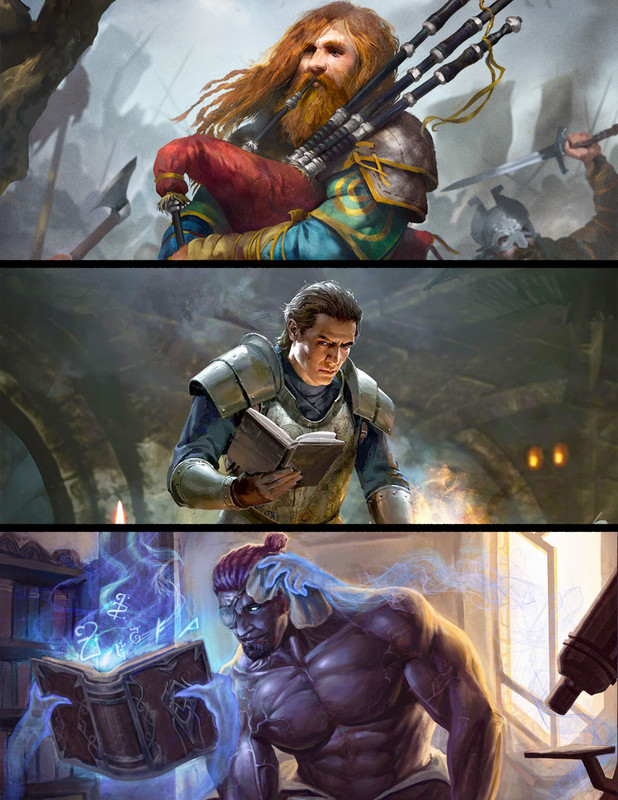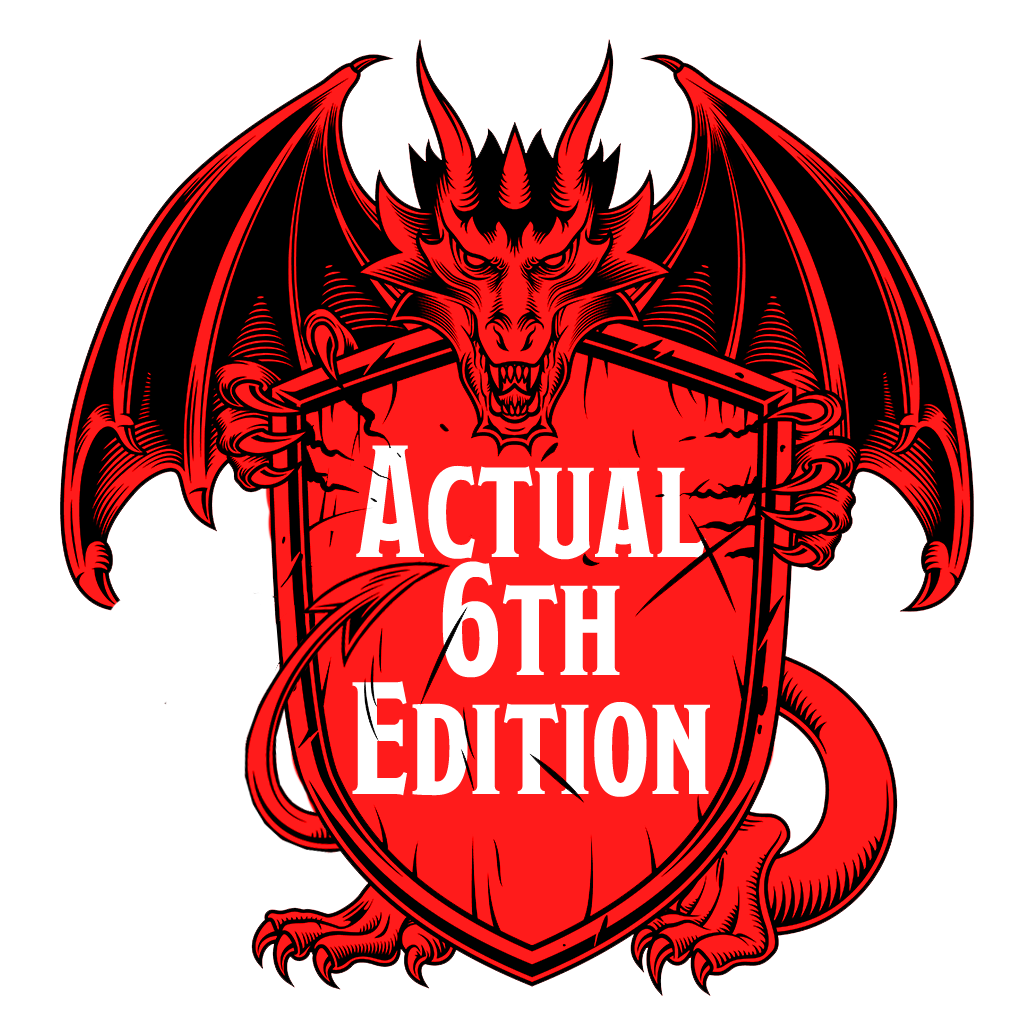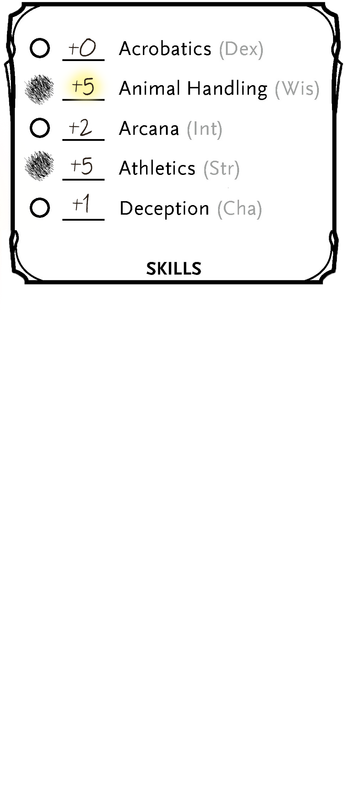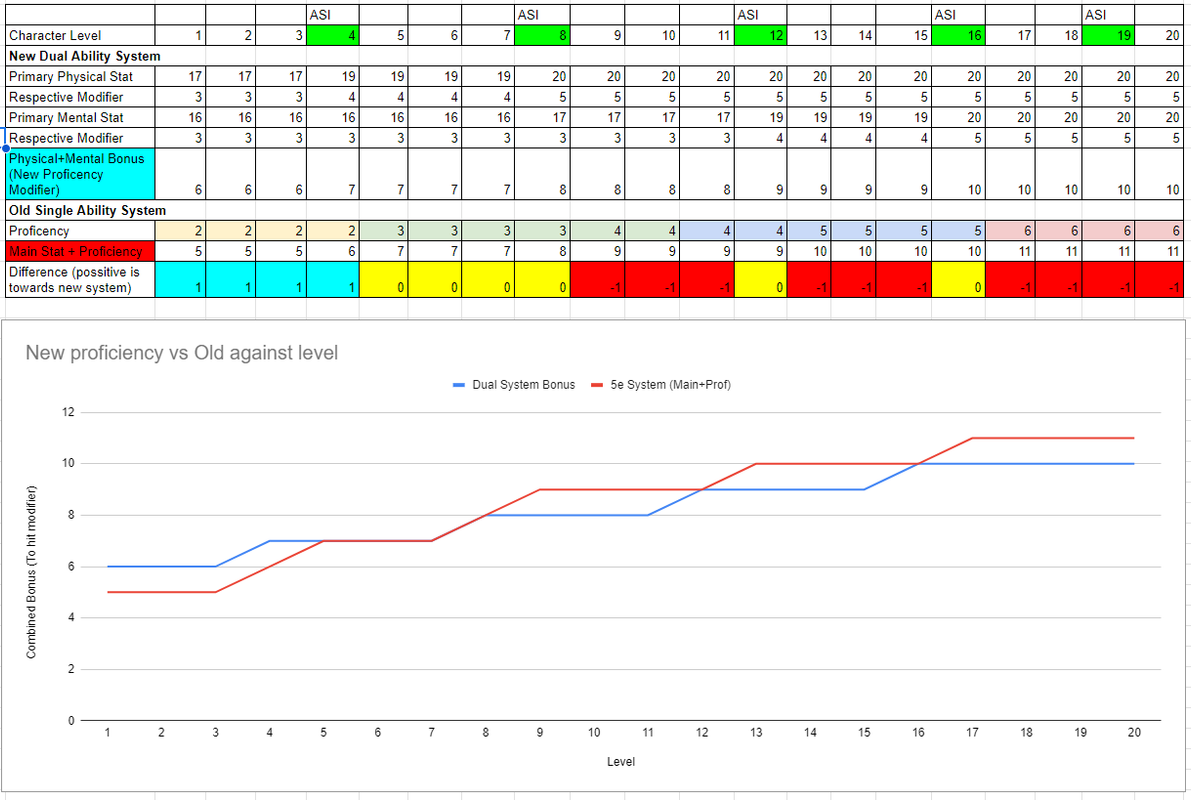

Lets Talk About Ability Scores
Now, a quick introduction to give context to the document your about to read, I am currently undertaking a project titled Actual 6th Edition (A6E) with the sole goal to create a improved 5th edition, keeping what works so well while fixing the problems that have become apparent in its magnificent ten year run. In the last couple months, I've released multiple playtests for reworked systems that could be added to any 5e game, today I'm starting to look into the foundations of 5e to see what can be approved.
The Problems
For this document, I'm trying to impact quite a few problems including the martial disparity, SAD vs MAD difficulty and the limited skill system by fixing the foundations of Ability Scores.
Problem 1: Not all ability scores are made equal
5e was designed to be mostly rules light in roleplay, with intentionally no systems for relationship tracking or social combat, the game purely relies on the 14 mental skill checks available for its roleplay mechanics, allowing players to be very free to just converse in character naturally.
Every class in 5e, has a primary ability score or occasionally two, this ability score without much deviation will always be the highest out of the 6 on the character sheet, followed by a secondary stat that will most likely have to be strength, dexterity or constitution, so that the character is viable in combat. Even if you wanted your fighter to be charismatic, making charisma your secondary stat is, without a doubt, punishing your combat effectiveness, to then still be outclassed by classes that just get to maximize a mental ability score while maintaining their combat effectiveness.
Now some of your already know where this is going, these two game design principles together create a problem, the classes who's primary ability is a mental (intelligence, charisma, wisdom) are automatically better in the roleplay pillar than classes that must focus on a physical ability score first.
Problem 2: Its all so limiting
While the proficiency system was designed to allow characters across classes to be good at any skill check, unfortunately, they can't. Your wizard can take proficiency in perception, but if you have a cleric, druid or ranger in the party, they just wont compete with them, even if the wisdom based class doesn't take proficiency; if your wizard has a 14 wizard, you would have to wait on average to level 9 to be better than them at something you took proficiency in.
The major reason for this actually being a problem however is due to the One Roller Rule, GM's know that if they ask the whole table for a perception check, its basically giving it to them for free, so most turn to allowing two players to roll or one with advantage. Now as I'm sure you've seen at your table, what happens every time you ask for this check? You'll hear: "Who's got the best perception?"
Now this means, when it comes to skill checks, very rarely is it ever useful to be the second best at something.
Problem 3: Can you accurately convey your character?
To give you some fun hypotheticals to think about: Does a clock maker in a wheelchair have high or low dexterity? Does a old and blind elder have low or high wisdom? Does a unintelligent but highly educated person have low or high Intelligence?
A lot of those fun character designs, while possible within DND, often come out weirdly presented. While some might be okay with having their high dexterity just represent their tinkering abilities in the case of the wheelchair bound clock maker, it can break down the fantasy when their the quickest to escape a fireball.
Or another example, while you could take proficiency in history and have low intelligence to attempt to accurately represent the character, sadly that would result in you being quite bad at history checks, you could take expertise to try and combat this but you will often come out feeling like your fighting against a system that won't allow your unique character design.
Lets talk about the Sacred Cow
Now, I am going to propose some pretty substantial changes to 5e's design, something we have all played and loved for ten years. When designing this rework, I really had to question the parts of the game I took as default and that I perceived as unchangeable. As always, I am very welcoming of feedback and this is only a proposed change and could be reworked completely if needed.
However, I only ask that you keep an open mind, because if you really want to fix the problems within 5e, some things are going to have to change. Sometimes you can patch up a house by repairing its broken windows or replacing the flooring, but if your house keeps collapsing, then you have to look to its foundations.
Now to the fun stuff...
Body & Mind:
The Dual Ability Score System

Physical vs Mental Attributes
Your six ability scores are now broken down into two categories; your Physical Attributes which include strength, dexterity and constitution, and your Mental Attributes which include intelligence, wisdom and charisma.
When a feature refers to your Physical Foci, it is referring to your highest ability score out of strength, dexterity or constitution. Which for our example player on the left would be Strength (17) and your Physical Foci Modifier would be +3 .
When a feature refers to your Mental Foci, it is referring to your highest ability score out of intelligence, wisdom and charisma. Which for our example player on the left would be Intelligence (15) and their Mental Foci Modifier would be +2 .
Everyone who fights dragons is tough
Now each class will have a primary physical and mental attribute, or the ability to choose in some instances. For example, the fighter's physical foci will be chosen as normal, strength if they wish to wield heavy weapons and hit hard, or dexterity if they prefer the weight of a bow, or maybe if their primary goal is to protect their allies, they could choose constitution so they survive the impacts of battle for longer. Then for their mental foci they are free to choose from intelligence, wisdom or charisma depending on the persona of their character.
As will become apparent while reading this document, now every class will use a physical and mental ability score to calculate skill bonuses, spell and maneuvers DC's, spell and attack bonuses, and ability uses. Be a intelligent greataxe wielder using your knowledge of battle and your strength to defeat your foes.
A new way to calculate proficiency
Thats right! Good bye arbitrary number of proficiency and welcome dual ability proficiency. Now your Proficiency Modifier is calculated by adding the modifiers of your physical and mental foci. Now when you would normally add a ability score + proficiency, you now instead just add your proficiency modifier.


Skill Proficiency
When you gain proficiency in a skill, you can now add your proficiency modifier in place of its default ability score. For example, our character to the left would have -1(8 wisdom) to animal handling checks but because they have proficiency; they now have a +5 to any animal handling check.
Now you might be asking; how does it make sense for a low wisdom character to be good at animal handling? Well, can someone be unwise but perceptive? or unintelligent but knowledgeable? How about a charismatic liar having great insight because a lier always knows when someones lying?
Gaining Skill Proficiencies
You gain two proficienes from your background or Archetype choice; these give you access to any skill that fits your character.
Now instead of gaining skill proficiencies from your class at character creation, you gain proficiency in two skills of your primary physical and mental attribute. So for example; if your physical foci is strength and your mental foci is wisdom, you gain proficiency in two skills of your choice from: Animal Handling, Athletics, Insight, Medicine, Perception or Survival.
Bards and Rangers gain an additional skill proficiency in their physical and mental foci, while Rogues gain an additional 2 for 6 total at character creation.
Jack of All Trades
replaces the Bard's 2nd level Jack of All Trades feature
Starting at 2nd level, you can add +1 to any ability check you make that doesn't already include your proficiency bonus. When you reach level 5, this bonus increased to +2, at level 10 it increases to +3 and again at level 17 to +4.
Weapon Proficiencies
When you are proficient in a weapon, you now add your Proficiency Modifier to any attack roll made with that weapon. However, you still only add your strength modifier to the damage of the weapon or dexterity if the weapon is ranged or has the finesse property.
Calculating Save DC's
When calculating your DC for spell saves, maneuvers, or any other DC calculated by adding your proficiency to a ability score modifier, you now replace them both with your proficiency modifier.
Spell Save DC
Spell attack modifier
Maneuver save DC
Certain DC's will have prerequisites such as using your intelligence as your mental attribute for wizards:
Wizard Spell Save DC = 8 + your proficiency modifier (Using intelligence as your mental attribute)
A table is at the end listing all DC prerequisites for use in your 5e games, in A6E this will be built into the classes.
Ability uses equal to proficiency
When a ability has a number of uses equal to proficiency bonus, it now scales off your mental or physical foci dependent on your class, listed in the table at the end.
Ability Score Reworks
Now I'm going to touch on individual changes to each ability score with the intention to balance them out better.
Strength
When an ability is the most common dump stat, its usually a good sign it needs some love. While RAW there is a lot of situations that make strength useful, they're often not presented easy enough for GM's to remember, often presented in lbs per strength score instead of 'real' world examples.
Now strength has clear lines for medium (now requiring a certain level of strength) and heavy armor, if and when they can carry or drag another person and the ability to re roll damage die.
Dexterity
Considered to be highly powerful skill due to its wide array of uses, dexterity can remain mostly the same. As we are attempting to buff strength and constitution instead of nerfing dexterity.
Strength Tiers
| Ability Score | 11 | 12 | 13 | 14 | 15 |
|---|---|---|---|---|---|
| Are able to wear medium armor | Can drag a average creature at ½ speed | Are able to wear heavy armour | |||
| Ability Score | 16 | 17 | 18 | 19 | 20 |
| You gain Consistent Fighter: Whenever you roll a 1 on a damage die, you can reroll the die and must use the new roll, no matter what the new roll is. | Are able to carry an average Creature at full speed or drag a heavy or armoured creature at 1/2 speed | Consistent fighter now works on 1 or a 2. | Are able to carry heavy and heavily armoured creatures at full speed. | Consistent fighter now works on a 1, 2 or 3. |












Constitution
Ahh, good old constitution, a necessary stat across all classes puts it firmly in the middle of importance for most players, with few players daring to put it below 12 and very few having the available ASI's to increase it above 16, along with its 0 skill checks, constitution is a bit of an odd one out among the other ability scores.
Firstly, it's effect on hit points also creates some design problems, hit die size is the primary tool use to differentiate the HP pool of classes, however the math behind these creates a rather lackluster experience; the difference between a D10 and D6 hit die seems large, however it is actually only +2 hit points per level. A fighter only gets 2 extra hit points per level than a wizard, ignoring the fact that many casters are able to prioritize constitution second, narrowing the gap.
Therefore, constitution is getting a complete rework, you now add half your constitution modifier (rounded up) to your HP instead (due to hit die rework) and additionally two skills have been added that make up your characters fortitude.
Endurance (Con)
Your Endurance (Constitution) check measures your ability to push past your limits or ignore your survival instincts; you might make a Endurance check when your trying to survive without food, hold your breath, complete a forced march, go without sleep, hold up a heavy object for a extended time or withstand perilous weather.
Additionally, you might make a Endurance check to not increase your exhaustion.
Resilience (Con)
Your Resilience (Constitution) check measures your ability to stay strong against the difficulties of being an adventurer. You might make a resilience check to not be frightened of a terrible visage, to stand your ground against a shove or to not fall into your characters old bad habits.
The New Frightened Condition
Whenever your character fails a Resilience check to not be frightened, they gain a bane die, if they already process a bane die then the the bane die size increases by 1 instead, up to a maximum size of a d12.
Bane Die
When a creature gains a bane die, from then on whenever the creature makes a attack roll, ability check or saving throw; they must roll a d4 and subtract the number from the total.
If a creature gains a bane die while already having one, they instead increase the die size of their bane die by 1 up to a d12.
Bless Die
When a creature gains a bless die, from then on whenever the creature makes a attack roll, ability check or saving throw; they can roll a d4 and add the number to the total.
If a creature gains a bless die while already having one, they instead increase the die size of their bless die by 1 up to a d12.
Any feature that grants a bane or bless die will include when the die expires, most typically one minute or one hour
Hit Point Rework
Now, we're killing a lot of birds with many stones in this playtest, so why not fix HP while we are at it.
You now take max hit die at every character level, or roll your hit die twice and add them both to your HP. Here is the fighter for an example and the rest are at the end of the playtest:
Hit Points
- Hit Dice: 2d10 per fighter level
- Hit Points at 1st Level: 10 + half your Constitution modifier (rounded up)
- Hit Points at Higher Levels: 2d10 or (10) + half your Constitution modifier (rounded up) per fighter level after 1st
The real mathematical impacts of this can be seen at the end of the document but the difference is small at early tiers and intentionally wider at later tiers. This solves quite a few things: The tanks actually are substantially tankier than others, rolling for HP is actually worth it, more dice means much less likely to kill your character by bad HP rolls and more hit die for healing helps the adventuring day actually last - Instead of everyone running out of HP before spell slots
Charisma
Most of the mental skills are working as intended and bringing some great joy to the game, Charisma is lacking behind in skill checks by one (having 4 compared to wisdoms and intelligences 5) therefore introducing:
Culture (Cha)
Your Culture (Charisma) check measures your ability to understand the greeting practises of a foreign land, or to know the dangerous areas of the town, or possibly to complete a farewell ritual that failing could cause great disrespect to the leader of the frog people.
Class Changes
| Class | Mental Ability Options | Hit die per level (Static HP) | Proficiency uses per rest replacement |
|---|---|---|---|
| Artificer | Intelligence | 2d8 (8) | Physical Foci Modifier |
| Barbarian | Intelligence, Wisdom or Charisma | 2d12 (12) | Highest Mental Modifier |
| Bard | Charisma | 2d8 (8) | Physical Foci Modifier |
| Cleric | Wisdom | 2d8 (8) | Physical Foci Modifier |
| Druid | Wisdom | 2d8 (8) | Physical Foci Modifier |
| Fighter | Intelligence, Wisdom or Charisma | 2d10 (10) | Highest Mental Modifier |
| Monk | Wisdom | 2d8 (8) | Wisdom Modifier |
| Paladin | Charisma | 2d10 (10) | Charisma Modifier |
| Ranger | Wisdom | 2d10 (10) | Wisdom Modifier |
| Rogue | Intelligence, Wisdom or Charisma | 2d8 (8) | Highest Mental Modifier |
| Sorcerer | Charisma | 2d6 (6) | Physical Foci Modifier |
| Warlock | Intelligence, Wisdom or Charisma | 2d8 (8) | Physical Foci Modifier |
| Wizard | Intelligence | 2d6 (6) | Physical Foci Modifier |
Impacts of this system
Ability scores
Now, it was already dangerous to have your characters start with a 20 in their main ability but now its even greater so. This isn't really a problem if your using point buy but for rolling for stats I would recommend starting to use this method:
Balanced Stat Roll
Roll 4d6 drop lowest five times. Count them together and deduct the total from 75. The last number is your sixth ability score, provided it's greater than 3 and less than 19, otherwise re roll the set. You do not add any racial ASI's with this method.
If you roll really poorly, you get a reward at the end. If you roll high, you get a balancer at the end. Gambling, varying scores between players, but everyone is close enough in power level.
Trying this out
Obviously the classes were not designed to play with this system, however it should work with some fiddling for 95% of 5e, if this system is liked then it will be built into the foundations of A6e with classes built to use it.
The Maths
At the end of the document you can find out some of the maths behind these changes but to some it up:
Tier 1: Level 1-4
Dual ability system comes out ahead with a +1 above normal proficiency. I think this is perfectly fine because these lower levels are especially harsh and could use some buffing, level one should not be the deadliest level.
Tiers 2+
The systems remain identical until level 8 where the old system pulls ahead by +1 and keeps this maintained throughout most of the future levels, personally I think lowering everyone by 1 in the later game is a small change and overall won't make a big difference, and I'm sure a few people are happy to see late game skill checks lowered slightly.
What about feats?
This system does encourage players to take ASI's more frequently, which can result in less feats taken or as player feeling like you don't get to pick the cool feats as often. In my experience, the base game has this problem too, until your main stat is 20 and your odd ability scores are even, its hard to justify a for fun feat. At some point, we will have to redesign feats to fix their problems but for now:
I would recommend allowing your players to take a feat and a ASI, with one exception being that for half feats; they now don't give ASI bonuses but instead you can pick two half feats instead of one full feat.




Additional Feats
Additionally, here as some feats to playtest that work off this new system. They are designed to encourage even more varied characters! If at any point you no longer meet the requirements for a feat, you must at that point select a new feat for which you meet the prerequisites.
Wise Wizard
Prerequisite: Your highest physical score must be less 13, your primary class must be wizard
While you are feeble in body, your worldly experience has granted you much power.
You can use wisdom in place of your physical foci for calculating your proficiency modifier and your wizard features, save DC and spell attack bonus.
Buff But Nothing
Prerequisite: Your highest mental score must be less 13 and your physical foci must be strength
You've focused your body into a weapon, while letting your other attributes fall behind.
You can now add your strength modifier twice, instead of once, to any damage roll you make with a weapon which normally adds your strength modifier to the damage.
Additionally, if you are proficient in athletics, you can add double your strength modifier to any Strength (athletics) check you make instead of your proficiency modifier.
The Preacher
Prerequisite: Your primary class must be cleric.
Your connection to the gods is intrinsically tied to your ability to help others, to spread the word of your divine.
You can now use Charisma as your mental foci instead of Wisdom for your Cleric features and abilities, including your spell save DC and spell attack bonus.
The Mountain
Prerequisite: Your physical foci must be constitution
As you have grown to withstand many blows, the effects of the elements are little to you.
You gain resistance in any two damage types of your choice besides from bludgeoning, piercing or slashing.
The Mighty Bow Wielder
Prerequisite: Your highest mental score must be less 13 and your physical foci must be dexterity
You've focused your body into a deadly weapon when accompanied by string and fletching.
You can use dexterity in place of your mental foci for your to hit bonus with ranged weapons, additionally you can make a single attack as bonus action each turn, as long as that attack is with a ranged weapon.
Additionally, if you are proficient in acrobatics, sleight of hand or stealth, you can add double your dexterity modifier to any of those skill checks you make instead of your proficiency modifier.
Primary Class
When a feature refers to your primary class, it means the class in which you have the most levels in, if its a tie between two, it's your choice.
Actual 6th Edition
With OneDND set on being closer to a 5.1 than a real 6th edition, I like many within the community are frustrated by the lack of experimentation from the designers and their seeming unwillingness to fix any of the real problems the game faces. I am but a humble long time homebrewer but am willing to try and create the next great edition!
What makes this project different?
While they're are many great 5e based systems out there, there is none that seem to do what many people want, make 5e better. Not a game with some 5e elements, not a mix between 5e and another system, not a game that changes the fundamentals that made 5e so great. A game that stays in line with the great design philosophies of 5e while fixing the problems that have come apparent during its ten year run, thats what a good chunk of the community have shown me they want and I hope with my passion I can complete this task for my game and everyones.
Design Philosophy
First: Rules stay light in roleplay to not inhibit the expression of story and remain heavy in combat but never to a hindering amount.
Second: The GM is there to have fun, the rules they utilize should never hinder this, the GM should have the ability to adapt to situations knowing the rules are their to support them.
Third: This system shall remain playable for the less savvy players and those who search for depth. Where ever possible the player should have the option of complexity or simplicity.
Further info on design philosophy can be found on the discord
Community Engagement
First and foremost, this project will tackle the problems that the community as a whole agree on. Throughout the project, I will release updates and supplements to be playtested by those who would intend to use them and then use feedback provided to improve the system as a whole. There should be no surprises when this project finishes, those who engage shall already know what to expect, too many times have people been burnt by projects failing to live up to their promises. If you want to be a part, please join us on the discord or give feedback on my reddit posts.
Helping
If you would like to add any 5e problems or missing systems to the list on the right or talk about your thoughts on creating A6E, the best place to talk to me is in the discord:
Problems to Fix
Problem Status Expertise WIP Fighting Styles Pending Adventuring Day Pending Encounter Design/CR Pending SR/LR Disparity WIP Martial/Caster Disparity WIP High level Problem spells WIP Monster Complexity Pending Mounted Combat Pending Tools Pending Darkvision Pending Bad DMG Pending Tiers of play Pending Class Design WIP* Backgrounds WIP Ability Scores & HP WIP
Missing Systems to Add
System Status Downtime WIP GM Game Choice Pending GM running the game advice Pending Exploration Rules Pending Mass Combat Rules Pending Tools/Spells for mystery based arcs Pending

Fixing Ability Scores
A fundamental rework to the single ability score system, the powers granted by ability scores and proficiency.
Version 0.6 Created by /u/TheBritishDM
Cover top - Heymaey Skald - Grafit Art
Cover middle - The Elder Scrolls: Legends - Edward Chee
Cover bottem - Muscular Wizard - Dat Phan
Page 5 - Rook - Dragonborn - Cookie
Page 7 - Orc Brawler - Gianmarco Falerni
Backcover - Rise of the Overlords - Greg Rutkowski
Additional A6E content and other TheBritishDM Homebrew content, including system redesigns can be found for free on GM Binder.
This work includes material taken from the System Reference Document 5.1 (“SRD 5.1”) by Wizards of the Coast LLC and available at https://dnd.wizards.com/resources/systems-reference-document. The SRD 5.1 is licensed under the Creative Commons Attribution 4.0 International License available at https://creativecommons.org/licenses/by/4.0/legalcode.
Link For Data
Below is the comparison of the 5e and A6E proficiency systsms. Additionally here is a very in depth and way to mathy comparison of all HP Methods and the normal distribution of rolling hit die:
New Proficiency compared to Old
